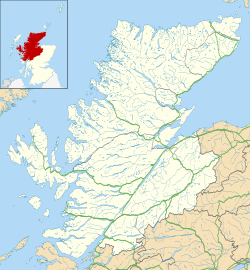St. Andrew's Cathedral, Inverness
| Cathedral Church of Saint Andrew | |
|---|---|

St Andrews Cathedral from Bishops Road
|
|
| 57°28′28″N 4°13′45″W / 57.47444°N 4.22917°WCoordinates: 57°28′28″N 4°13′45″W / 57.47444°N 4.22917°W | |
| Denomination | Scottish Episcopal Church |
| Churchmanship | High Church |
| Website | www.invernesscathedral.com |
| History | |
| Dedication | St Andrew |
| Administration | |
| Diocese | Moray, Ross & Caithness |
| Clergy | |
| Provost and rector | Vacant |
Inverness Cathedral (Scottish Gaelic: Cathair-Eaglais Inbhir Nis), also known as the Cathedral Church of Saint Andrew (1866–69), is a cathedral of the Scottish Episcopal Church situated in the city of Inverness in Scotland close to the banks of the River Ness. It is the seat of the Bishop of Moray, Ross and Caithness, ordinary of the Diocese of Moray, Ross and Caithness. The cathedral is the northernmost cathedral in mainland Britain (Dornoch Cathedral is not actually a cathedral) and was the first new Protestant cathedral to be completed in Great Britain since the Reformation.
Bishop Robert Eden decided that the Cathedral for the united Diocese of Moray, Ross and Caithness should be in Inverness. The foundation stone was laid by the Archbishop of Canterbury, Charles Longley, in 1866 and construction was complete by 1869, although a lack of funds precluded the building of the two giant spires of the original design. The architect was Alexander Ross, who was based in the city. The cathedral is built of red Tarradale stone, with the nave columns of Peterhead granite.
The cathedral congregation began as a mission in 1853, on the opposite side (east) of the River Ness.
The nave looking south towards the choir
The nave looking north towards the entrance
The choir and altar
...
Wikipedia

